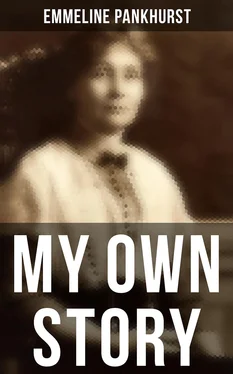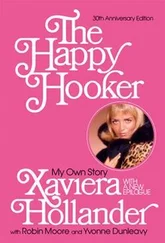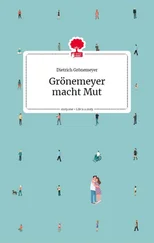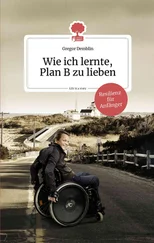The next morning fifty-seven women and two men were arraigned, two and three at a time, in Westminster police court. Christabel Pankhurst was the first to be placed in the dock. She tried to explain to the magistrate that the deputation of the day before was a perfectly peaceful attempt to present a resolution, which, sooner or later, would be presented and acted upon. She assured him that the deputation was but the beginning of a campaign that would not cease until the Government yielded to the women's demand. "There can be no going back for us," she declared, "and more will happen if we do not get justice."
The magistrate, Mr. Curtis Bennett, who was destined later to try women for that "more," rebuked my daughter sternly, telling her that the Government had nothing to do with causing the disorders of the day before, that the women were entirely responsible for what had occurred, and finally, that these disgraceful scenes in the street must cease—just as King Canute told the ocean that it must roll out instead of in. "The scenes can be stopped in only one way," replied the prisoner. His sole reply to that was, "Twenty shillings or fourteen days," Christabel chose the prison sentence, and so did all the other prisoners. Mrs. Despard, who headed the deputation, and Sylvia Pankhurst, who was with her, were given three weeks in prison.
Of course the raid, as it was called, gave the Women's Social and Political Union an enormous amount of publicity, on the whole, favourable publicity. The newspapers were almost unanimous in condemning the Government for sending mounted troops out against unarmed women. Angry questions were asked in Parliament, and our ranks once more increased in size and ardour. The old-fashioned suffragists, men as well as women, cried out that we had alienated all our friends in Parliament; but this proved to be untrue. Indeed, it was found that a Liberal member, Mr. Dickinson, had won the first place in the ballot, and had announced that he intended to use it to introduce a women's suffrage bill. More than this, the prime minister, Sir Henry Campbell-Bannerman, promised to give the bill his support. For a time, a very short time, it is true, we felt that the hour of our freedom might be at hand, that our prisoners had perhaps already won us our precious symbol—the vote.
Soon, however, a number of professed suffragists in the House began to complain that Mr. Dickinson's bill, practically the original bill, was not "democratic" enough, that it would enfranchise only the women of the upper classes—to which, by the way, most of them belonged. That this was not true had been proved again and again from the municipal registers, which showed a majority of working women's names as qualified householders. The contention was but a shallow excuse, and we knew it. Therefore we were not surprised when Sir Henry Campbell-Bannerman departed from his pledge of support, and allowed the bill to be talked out.
Following this event, the second Women's Parliament assembled, on the afternoon of March 20, 1907. As before, we adopted a resolution calling upon the Government to introduce an official suffrage measure, and again we voted to send the resolution from the hall to the Prime Minister. Lady Harberton was chosen to lead the deputation, and instantly hundreds of women sprang up and volunteered to accompany her. This time the police met the women at the door of the hall, and another useless, disgraceful scene of barbarous, brute-force opposition took place. Something like one thousand police had been sent out to guard the House of Commons from the peaceful invasion of a few hundred women. All afternoon and evening we kept Caxton Hall open, the women returning every now and again, singly and in small groups, to have their bruises bathed, or their torn clothing repaired. As night fell the crowds in the street grew denser, and the struggle between the women and the police became more desperate. Lady Harberton, we heard, had succeeded in reaching the entrance to the House of Commons, nay, had actually managed to press past the sentries into the lobby, but her resolution had not been presented to the Prime Minister. She and many others were arrested before the police at last succeeded in clearing the streets, and the dreadful affair was over.
The next day, in Westminster police court, the magistrate meted out sentences varying from twenty shillings or fourteen days to forty shillings or one month's imprisonment. Two of the women, Miss Woodlock and Mrs. Chatterton, who had left Holloway only a week before, were, as "old offenders," given thirty days without the option of a fine. Another woman, Mary Leigh, was given thirty days because she offended the magistrate's dignity by hanging a "Votes for Women" banner over the edge of the dock. Those of my readers who are unable to connect the word "militancy" with anything milder than arson are invited to reflect that within the first two months of the year 1907 the English Government sent to prison one hundred and thirty women whose "militancy" consisted merely of trying to carry a resolution from a hall to the Prime Minister in the House of Commons. Our crime was called obstructing the police. It will be seen that it was the police who did the obstructing.
It may be asked why neither of these deputations was led by me personally. The reason was that I was needed in another capacity, that of leader and supervisor of the suffrage forces in the field to defeat Government candidates at by-elections. On the night of the second "riot," while our women were still struggling in the streets, I left London for Hexham in Northumberland, where by our work the majority of the Liberal candidate was reduced by a thousand votes. Seven more by-elections followed in rapid succession.
Our by-election work was such a new thing in English politics that we attracted an enormous amount of attention wherever we went. It was our custom to begin work the very hour we entered a town. If, on our way from the station to the hotel, we encountered a group of men, say, in the market-place, we either stopped and held a meeting on the spot, or else we stayed long enough to tell them when and where our meetings were to be held, and to urge them to attend. The usual first step, after securing lodgings, was to hire a vacant shop, fill the windows with suffrage literature, and fling out our purple, green, and white flag. Meanwhile, some of us were busy hiring the best available hall. If we got possession of the battle-ground before the men, we sometimes "cornered" all the good halls and left the candidate nothing but schoolhouses for his indoor meetings. Truth to tell, our meetings were so much more popular than theirs that we really needed the larger halls. Often, a candidate with the Suffragettes for rivals spoke to almost empty benches. The crowds were away listening to the women.
Naturally, this greatly displeased the politicians, and it scandalised many of the old-fashioned Liberal partisans. In one place, I think it was Colne Valley in Yorkshire, an amusing instance of masculine hostility occurred. We had arrived on a day when both Conservative and Liberal committees were choosing their candidates, and we thought it a good opportunity to hold a series of outdoor meetings. We tried to get a lorry for a rostrum, but the only man in town who had these big vans to let disapproved of Suffragettes so violently that he wouldn't let us have one. So we borrowed a chair from a woman shopkeeper, and went at it. Soon we had a large crowd and an interested audience. We also got the attention of a number of small boys with pea-shooters, and had to make our speeches under a blistering fire of dried peas.
While I was speaking the fire ceased, to my relief—for dried peas sting. I continued my speech with renewed vigor, only to have one of my best points spoiled by roars of laughter from the crowd. I finished somehow, and sat down; and then it was explained to me that the pea-shooters had been financed by one of the prominent Liberals of the town, another man who disapproved of our policy of opposing the Government. As soon as the ammunition gave out this man furnished the boys with a choice supply of rotten oranges. These were not so easily handled, it appeared, for the very first one went wild, and struck the chivalrous gentleman violently in the neck. This it was that had caused the laughter, and stopped the attack on the women.
Читать дальше












